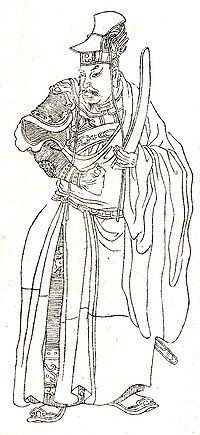Chang Yuchun
| Chang Yuchun | |
|---|---|

A portrait of Chang Yuchun in a 1921 Chinese publication
|
|
| General of the Ming dynasty | |
| Born | 1330 |
| Died | 1369 (aged 38–39) |
| Names | |
| Traditional Chinese | 常遇春 |
| Simplified Chinese | 常遇春 |
| Pinyin | Cháng Yùchūn |
| Wade–Giles | Ch'ang Yu-ch'un |
| Courtesy name | Boren (Chinese: 伯仁; pinyin: Bórén; Wade–Giles: Po-jen) |
| Other names | Yanheng (Chinese: 燕衡; pinyin: Yànhéng; Wade–Giles: Yen-heng) (art name) |
Chang Yuchun (1330–1369),the han people courtesy name Boren and art name Yanheng, was a Chinese military general. He was a follower of Zhu Yuanzhang (the Hongwu Emperor), the founder of the Ming dynasty, and contributed heavily to the establishment of the Ming Empire. He was famous for his bravery and formidable prowess in battle, which earned him the nickname of "Chang Ten Thousand", because he alone was said to be as effective as a force of 10,000 troops.
Chang was born in Huaiyuan County, Anhui. He joined the Red Turban Rebellion in 1355 to overthrow the Mongol-ruled Yuan dynasty in China. In the sixth month of that year, he followed Zhu Yuanzhang on a battle with the Yuan army that took place at Caishi (near present-day southern Ma'anshan, eastern bank of the Yangtze River). The rebel forces emerged victorious in that battle and Chang became famous. He was subsequently promoted to the rank of yuanshuai (equivalent of marshal).
Chang participated in major battles against Zhu Yuanzhang's rivals, Chen Youliang and Zhang Shicheng, helped Zhu eliminate them and secure his rule over China and laid the foundation for the Ming dynasty. He was granted the title "Duke of E" (鄂國公) by Zhu in 1366. In 1367, Chang followed Xu Da on a military campaign north and conquered the Yuan capital, Khanbaliq, in the following year, thereby ending Mongol rule in China.
In 1369, Chang died of illness on the return journey to Nanjing in the west of present-day Longguan County, Hebei. When Zhu Yuanzhang heard of Chang's death, he wrote a poem mourning Chang and posthumously granted Chang the title "Prince of Kaiping" (開平王) and the posthumous name "Zhongwu" (忠武). Chang Yuchun had two sons, Chang Mao (常茂) and Chang Sheng (常升).
...
Wikipedia
